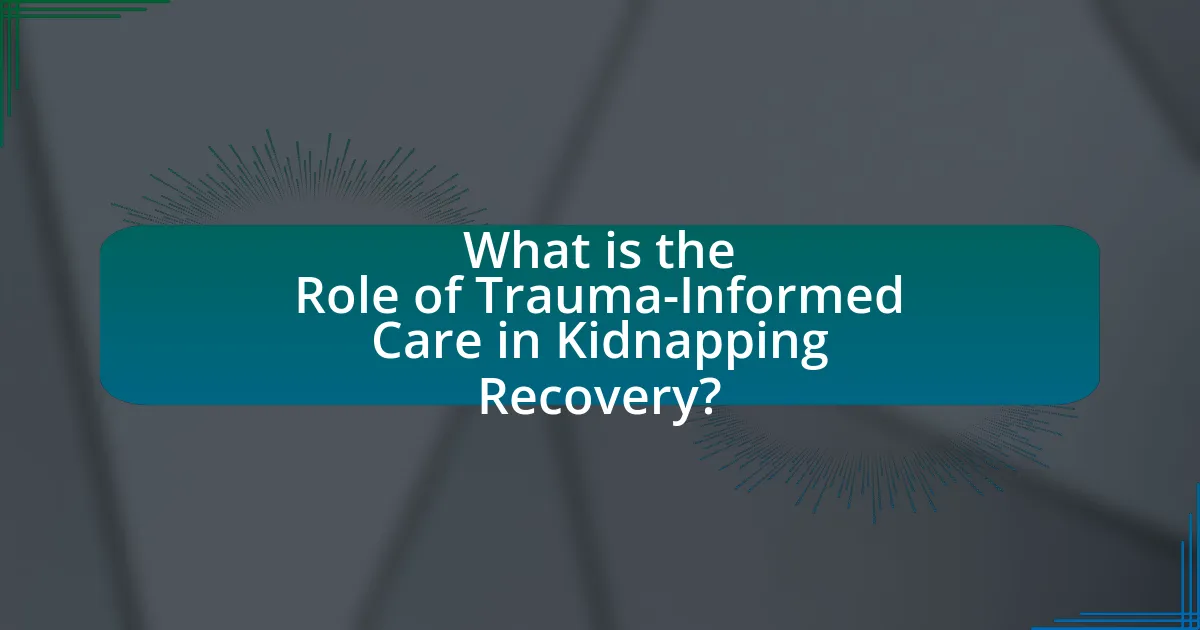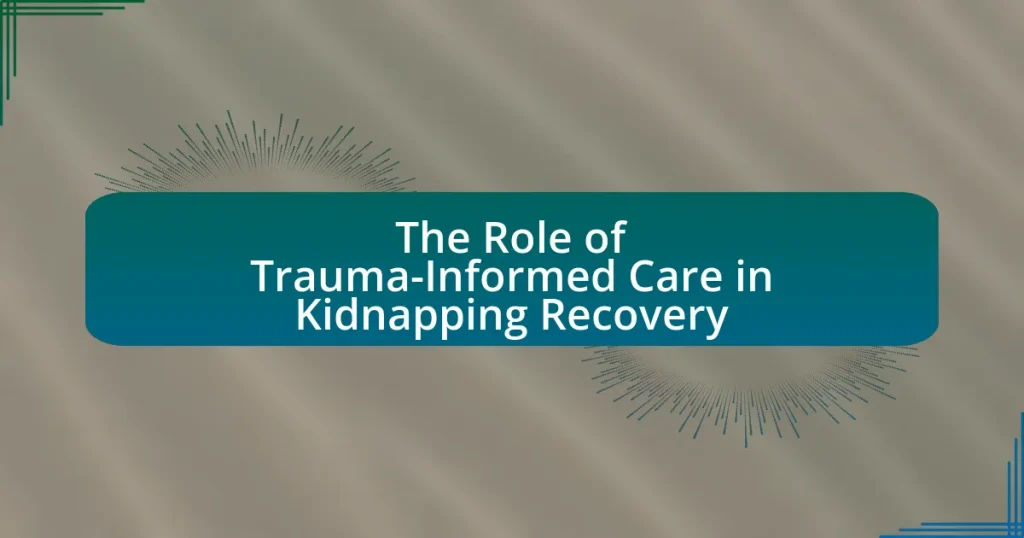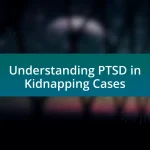Trauma-informed care (TIC) is essential in the recovery process for kidnapping survivors, addressing the psychological, emotional, and physical challenges they face due to trauma. This approach emphasizes safety, trustworthiness, peer support, collaboration, empowerment, and cultural sensitivity, which are critical for effective healing. Research shows that TIC can significantly improve recovery outcomes by reducing symptoms of PTSD and anxiety, fostering a supportive environment that enhances emotional regulation and resilience. The article explores the principles of TIC, its application in kidnapping recovery, the psychological impacts on survivors, and the challenges and strategies for implementing this care model effectively.

What is the Role of Trauma-Informed Care in Kidnapping Recovery?
Trauma-informed care plays a crucial role in kidnapping recovery by prioritizing the understanding of trauma’s impact on survivors. This approach recognizes that individuals who have experienced kidnapping often face psychological, emotional, and physical challenges stemming from their trauma. By implementing trauma-informed care, practitioners create a safe environment that fosters trust and empowerment, which is essential for effective healing. Research indicates that trauma-informed practices can significantly improve outcomes for survivors, as they help mitigate symptoms of PTSD and anxiety, facilitating a more supportive recovery process.
How does Trauma-Informed Care address the needs of kidnapping survivors?
Trauma-Informed Care (TIC) addresses the needs of kidnapping survivors by recognizing the pervasive impact of trauma on their mental and emotional well-being. TIC principles emphasize safety, trustworthiness, peer support, collaboration, empowerment, and cultural sensitivity, which are crucial for creating a supportive environment for survivors. Research indicates that survivors often experience symptoms of post-traumatic stress disorder (PTSD), anxiety, and depression, making it essential for care providers to approach treatment with an understanding of these challenges. By implementing TIC, practitioners can tailor interventions that promote healing and resilience, ultimately improving recovery outcomes for kidnapping survivors.
What are the key principles of Trauma-Informed Care?
The key principles of Trauma-Informed Care include safety, trustworthiness, peer support, collaboration, empowerment, and cultural, historical, and gender issues. Safety ensures that individuals feel physically and emotionally secure in their environment. Trustworthiness involves transparency and consistency in interactions, fostering a reliable relationship between caregivers and survivors. Peer support emphasizes the importance of shared experiences in recovery, while collaboration encourages active participation of individuals in their care. Empowerment focuses on building individual strengths and resilience, and addressing cultural, historical, and gender issues ensures that care is respectful and relevant to diverse backgrounds. These principles are foundational in creating an environment conducive to healing, particularly in contexts such as kidnapping recovery, where trauma significantly impacts individuals’ well-being.
How do these principles apply specifically to kidnapping recovery?
Trauma-informed care principles apply to kidnapping recovery by prioritizing the safety, trustworthiness, and empowerment of survivors. These principles recognize that individuals who have experienced kidnapping often suffer from significant psychological trauma, necessitating a supportive environment that fosters healing. For instance, creating a safe space allows survivors to feel secure, which is essential for their recovery process. Additionally, involving survivors in their own recovery plans enhances their sense of control and agency, which is crucial for rebuilding their self-esteem and resilience. Research indicates that trauma-informed approaches can lead to better mental health outcomes, as they address the specific needs of trauma survivors, thereby facilitating a more effective recovery process.
Why is Trauma-Informed Care essential for effective recovery?
Trauma-Informed Care is essential for effective recovery because it recognizes the widespread impact of trauma on individuals and tailors interventions accordingly. This approach fosters a safe environment that promotes trust, empowerment, and healing, which are critical for individuals recovering from traumatic experiences such as kidnapping. Research indicates that trauma-informed practices can significantly improve outcomes by reducing re-traumatization and enhancing engagement in treatment, as evidenced by a study published in the Journal of Trauma & Dissociation, which found that trauma-informed care leads to better psychological and emotional outcomes for survivors.
What psychological impacts do kidnapping survivors face?
Kidnapping survivors face significant psychological impacts, including post-traumatic stress disorder (PTSD), anxiety, depression, and difficulties in social reintegration. Research indicates that approximately 30% of kidnapping survivors develop PTSD, characterized by flashbacks, nightmares, and severe anxiety. Survivors often experience heightened levels of fear and hyper-vigilance, which can lead to avoidance behaviors and social isolation. Additionally, studies show that many survivors struggle with trust issues and relationship difficulties, stemming from the trauma of their experience. These psychological effects can persist long after the kidnapping incident, necessitating specialized trauma-informed care to support recovery and reintegration into society.
How can Trauma-Informed Care mitigate these impacts?
Trauma-Informed Care can mitigate the impacts of kidnapping by creating a supportive environment that recognizes and responds to the effects of trauma. This approach emphasizes safety, trustworthiness, and empowerment, which are crucial for individuals recovering from traumatic experiences. Research indicates that implementing Trauma-Informed Care principles can lead to improved emotional regulation, reduced symptoms of PTSD, and enhanced overall well-being in survivors. For instance, a study published in the Journal of Trauma & Dissociation found that trauma-informed practices significantly decreased anxiety and depression levels among trauma survivors, demonstrating the effectiveness of this care model in facilitating recovery.
What are the challenges in implementing Trauma-Informed Care for kidnapping survivors?
Implementing Trauma-Informed Care for kidnapping survivors faces several challenges, including the need for specialized training among caregivers, the variability in individual trauma responses, and the potential for re-traumatization during treatment. Caregivers often lack adequate training in trauma-informed approaches, which can lead to misunderstandings and ineffective support. Additionally, each survivor may exhibit different symptoms and coping mechanisms, complicating the application of a one-size-fits-all approach. Research indicates that without proper understanding of these individual differences, caregivers may inadvertently trigger distressing memories or emotions, further hindering recovery efforts.
What barriers do practitioners face in adopting this approach?
Practitioners face several barriers in adopting trauma-informed care in kidnapping recovery, including lack of training, insufficient resources, and systemic resistance. Lack of training limits practitioners’ understanding of trauma-informed principles, which can hinder effective implementation. Insufficient resources, such as funding and personnel, restrict the ability to provide comprehensive care. Systemic resistance often arises from traditional practices that prioritize immediate safety over psychological healing, making it challenging to integrate trauma-informed approaches into existing frameworks. These barriers collectively impede the effective application of trauma-informed care in supporting victims of kidnapping.
How can these barriers be overcome?
Barriers in kidnapping recovery can be overcome through the implementation of trauma-informed care practices. Trauma-informed care focuses on understanding the impact of trauma on individuals and creating a supportive environment that fosters healing. Research indicates that such an approach can significantly improve recovery outcomes for survivors, as it emphasizes safety, trustworthiness, and empowerment (Substance Abuse and Mental Health Services Administration, 2014). By training professionals in trauma-informed techniques, organizations can enhance their ability to address the unique needs of survivors, thereby reducing the barriers to effective recovery.
How does Trauma-Informed Care differ from traditional care approaches?
Trauma-Informed Care (TIC) differs from traditional care approaches by prioritizing an understanding of the impact of trauma on individuals and integrating this awareness into all aspects of care. Traditional care often focuses on diagnosing and treating symptoms without considering the underlying trauma that may contribute to those symptoms. In contrast, TIC emphasizes safety, trustworthiness, peer support, and empowerment, recognizing that trauma can affect a person’s emotional, psychological, and physical well-being. Research indicates that TIC can lead to better outcomes for individuals with trauma histories, as it fosters a supportive environment that promotes healing and resilience.
What are the limitations of traditional care for kidnapping survivors?
Traditional care for kidnapping survivors often fails to address the complex psychological and emotional needs resulting from trauma. This approach typically focuses on immediate physical health and safety, neglecting the long-term mental health implications such as PTSD, anxiety, and depression. Research indicates that traditional care models may lack the necessary trauma-informed practices that recognize the unique experiences of survivors, leading to inadequate support systems. For instance, a study published in the Journal of Traumatic Stress highlights that survivors often feel misunderstood and unsupported in conventional healthcare settings, which can exacerbate their trauma. Additionally, traditional care may not provide a safe space for survivors to process their experiences, further hindering their recovery.
How does a Trauma-Informed approach enhance recovery outcomes?
A Trauma-Informed approach enhances recovery outcomes by prioritizing safety, trustworthiness, and empowerment in the healing process. This approach recognizes the widespread impact of trauma and integrates this understanding into care practices, which fosters a supportive environment that can significantly improve emotional and psychological recovery. Research indicates that individuals who receive trauma-informed care report higher levels of engagement in treatment and improved mental health outcomes, as evidenced by a study published in the Journal of Trauma & Dissociation, which found that trauma-informed practices led to a 30% increase in treatment retention rates among survivors of trauma.
What specific strategies are effective in Trauma-Informed Care for kidnapping recovery?
Effective strategies in Trauma-Informed Care for kidnapping recovery include establishing safety, fostering trust, and promoting empowerment. Establishing safety involves creating a secure environment where survivors feel physically and emotionally safe, which is crucial for their healing process. Fostering trust is achieved through consistent, respectful communication and by being transparent about the recovery process, allowing survivors to feel valued and understood. Promoting empowerment involves encouraging survivors to make choices about their care and recovery, which helps restore a sense of control that may have been lost during the kidnapping experience. Research indicates that these strategies significantly enhance the recovery outcomes for trauma survivors, as they align with the principles of Trauma-Informed Care that prioritize the survivor’s needs and experiences.
What role does safety play in the recovery process?
Safety is a fundamental component of the recovery process, particularly in trauma-informed care for kidnapping survivors. It establishes a secure environment that fosters trust and allows individuals to begin processing their trauma. Research indicates that when survivors feel safe, they are more likely to engage in therapeutic interventions, which can significantly enhance their emotional and psychological recovery. For instance, a study published in the Journal of Traumatic Stress highlights that perceived safety is crucial for effective trauma recovery, as it enables individuals to confront and work through their experiences without the fear of re-traumatization.
How can practitioners build trust with survivors?
Practitioners can build trust with survivors by consistently demonstrating empathy, active listening, and respect for their autonomy. Establishing a safe and supportive environment is crucial, as survivors often experience trauma that affects their ability to trust others. Research indicates that trauma-informed care, which emphasizes understanding the impact of trauma on individuals, significantly enhances the therapeutic relationship. For instance, a study published in the Journal of Trauma & Dissociation highlights that practitioners who engage in trauma-informed practices foster a sense of safety and empowerment, leading to improved trust and collaboration with survivors.
What resources are available for implementing Trauma-Informed Care in kidnapping recovery?
Resources available for implementing Trauma-Informed Care in kidnapping recovery include training programs, guidelines from organizations, and therapeutic tools. The Substance Abuse and Mental Health Services Administration (SAMHSA) provides a comprehensive framework for Trauma-Informed Care, emphasizing safety, trustworthiness, peer support, and empowerment. Additionally, the National Center for Trauma-Informed Care offers resources and training specifically tailored for practitioners working with trauma survivors, including those affected by kidnapping. Research indicates that implementing these resources can significantly improve recovery outcomes, as evidenced by studies showing enhanced emotional regulation and resilience in trauma survivors who receive Trauma-Informed Care.
What training programs exist for practitioners?
Training programs for practitioners in trauma-informed care include the Trauma-Informed Care Training offered by the Substance Abuse and Mental Health Services Administration (SAMHSA), which focuses on understanding trauma’s impact and integrating this knowledge into practice. Additionally, the National Child Traumatic Stress Network (NCTSN) provides various training modules specifically designed for professionals working with children affected by trauma, including those in kidnapping recovery scenarios. These programs emphasize the importance of creating a safe environment, building trust, and promoting resilience among survivors.
How can organizations develop Trauma-Informed policies?
Organizations can develop Trauma-Informed policies by integrating principles that recognize the impact of trauma on individuals and creating an environment that promotes safety, trust, and empowerment. This involves training staff on trauma awareness, implementing practices that prioritize emotional and physical safety, and ensuring that policies reflect an understanding of trauma’s effects on behavior and well-being. Research indicates that organizations adopting Trauma-Informed approaches see improved outcomes in client engagement and satisfaction, as evidenced by studies showing that trauma-informed care can lead to a 30% increase in service utilization among trauma survivors.
What best practices should be followed in Trauma-Informed Care for kidnapping survivors?
Best practices in Trauma-Informed Care for kidnapping survivors include establishing safety, fostering trust, and promoting empowerment. Establishing safety involves creating a secure environment where survivors feel physically and emotionally safe, which is crucial for their recovery. Fostering trust is essential; caregivers should be consistent, transparent, and respectful, allowing survivors to feel valued and understood. Promoting empowerment means involving survivors in their care decisions, which enhances their sense of control and agency. Research indicates that these practices significantly improve outcomes for trauma survivors, as they address the core effects of trauma and support healing processes.
How can practitioners ensure a survivor-centered approach?
Practitioners can ensure a survivor-centered approach by actively involving survivors in decision-making processes regarding their care and recovery. This involvement respects the autonomy and preferences of survivors, which is essential in trauma-informed care. Research indicates that when survivors are empowered to make choices about their treatment, it leads to improved outcomes and greater satisfaction with the recovery process. For instance, a study published in the Journal of Trauma & Dissociation highlights that survivor participation in care planning significantly enhances their sense of control and agency, which are critical components of effective trauma recovery.
What ongoing support is necessary for long-term recovery?
Ongoing support necessary for long-term recovery includes consistent access to trauma-informed therapy, peer support groups, and community resources. Trauma-informed therapy helps individuals process their experiences and develop coping strategies, which is essential for emotional healing. Peer support groups provide a sense of belonging and shared understanding, fostering resilience and reducing feelings of isolation. Community resources, such as housing assistance and vocational training, are crucial for rebuilding lives and promoting stability. Research indicates that individuals who engage in these support systems demonstrate improved mental health outcomes and a greater ability to reintegrate into society after traumatic events.


